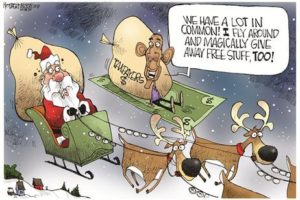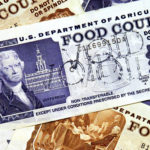Top Five Libertarian Christmas Wishes For Trump Administration
By Kitty Testa
Many of us will be opening gifts this weekend, tearing through the wrappings to find wonderful surprises, some we never knew we wanted, and some that came from our Christmas Wish Lists.
Wouldn’t it be a wonderful surprise if our new president fulfilled a few of our policy wishes? I’d be thrilled to leave cookies and milk out on Christmas Eve and wake up Christmas morning to find that Santa had checked off a few items from my grown up Christmas list and left them on Donald Trump’s desk to sign.
Though it’s not worthy of a Kelly Clarkson vocal, but here it is: My Top 5 Libertarian Policy Wish List.
1. End the Drone War

What is the drone war all about? Assassination. Assassination of individuals by the President of the United States. Victims of this assassination policy included a 16-year-old American citizen in 2011, who was the son of the intended target, and in Yemen at the time. In 2013, Rand Paul attempted to obtain a legal opinion from then Attorney General, Eric Holder, questioning whether the POTUS had the authority to use a drone on American soil to kill an American citizen. After Paul filibustered the confirmation of John Brennan as CIA director, Paul finally got his answer: No.
But do U.S. presidents have the authority to carry out a policy of assassination against individuals as long as they’re not on American soil?
Jeremy Scahill of The Intercept described the drone program this way in The Drone Papers:
From his first days as commander in chief, the drone has been President Barack Obama’s weapon of choice, used by the military and the CIA to hunt down and kill the people his administration has deemed — through secretive processes, without indictment or trial — worthy of execution. There has been intense focus on the technology of remote killing, but that often serves as a surrogate for what should be a broader examination of the state’s power over life and death.
As with most of George W. Bush’s military policies, President Obama adopted and expanded upon them. Bush authorized about 50 drone strikes, killing almost 500 people. Obama has authorized more than 500 drone strikes that have killed more than 3,500 people. Because of the of the lack of any legal process to identify who is to be targeted and why, there are questions as to how many victims were actually terrorist combatants and how many were collateral damage.
It’s important to note that nearly anyone can be nominated onto the assassination list, as is the case with other secret lists maintained by the U.S. government. All without notification or an opportunity to challenge one’s inclusion.
2. Repeal Obamacare and the ACA tax penalty

Donald Trump has already promised to repeal Obamacare. Even more so, he also has promised to replace it with “something better.” As with most of what Trump says, I have no idea what he really means.
The Republican congress is now planning a repeal of the Affordable Care Act, but is considering keeping some of the taxes in place.
Bad idea.
Since Trump is promising a replacement of Obamacare, the options for healthcare legislation can go in one of two directions, socialized medicine or free market healthcare.
Or maybe something more palatable is a hybrid system, as proposed by Avik. S. Roy in this 2012 article from The Atlantic. Roy notes that about 70% of healthcare needs differ little from other consumer purchases. We can shop around for price and quality among medical services just as we can for electronics and groceries. Only acute care, as when we are injured in an accident, have a stroke, or suffer a heart attack, remove our ability to make a consumer choice.
So why not get the government out of the majority of our healthcare needs and let the free market determine costs and availability of medical products and services?
3. A Balanced Budget

The national debt just keeps climbing. Just two months ago, the national debt was $19.7 trillion. In a mere 60 days, it is a hair under $19.9 trillion, and at this pace will ring in the new year eclipsing the $20 trillion mark.
But why?
Because politicians spend money like drunken sailors. That’s why.
Every year we add on to the national debt because Congress apparently is arithmetically challenged. Maybe we need to elect more accountants and fewer lawyers.
The group Americans for a Balanced Budget Amendment states that interest on the national debt is now the third largest item on the federal budget after defense programs and Social Security and Medicare.
Trump would do well to demand a balanced budget from Congress, and refuse to sign any budget that increases the deficit. This may be unlikely, but this is a wish list.
4. A Return to Free Market Interest Rates

Do you have a credit card? What is the interest rate? Is it 2%? 5%? It’s probably somewhere between 10% and 30%. Why the disparity between the rates that banks pay to borrow money (essentially 0%) and what they charge consumers? Free market interest rates. Credit card debt is unsecured, and people are apparently willing to pay astronomical interest rates to borrow money without putting up their assets as collateral.
The first point of the Federal Reserve System’s mission statement is to conduct “the nation’s monetary policy by influencing the monetary and credit conditions in the economy in pursuit of maximum employment, stable prices, and moderate long-term interest rates.”
Do we have maximum employment? No. We have a workforce participation rate of about 62%.
We do have relatively stable prices with an inflation rate of about 1.3%, but it is the market interest rates that consumers pay that are keeping inflation low. Consumers don’t just consider the price of the goods they buy, but if they are using credit (as many are), they need to consider the total cost, including interest. Retail sales are still lower than they were in 2006, not surprising with the workforce participation rate so low and unsecured consumer debt interest rates still relatively high.
So how would free market rates affect our economy? When a bank borrows money at 0%, its only incentive to lend that money is the opportunity cost of not making loans. Lending always involves risk, so the bank is now very, very picky about how it will lend that money. If a bank is borrowing money at 3%, it is now incentivized to lend the money out more freely because it incurs a true cost of interest in holding the funds. Lending money to companies that want to expand or to start-ups just getting off the ground is now more appealing. Economic activity would increase and we might even bring up that workforce participation rate.
5. Reschedule Cannabis

Even now as more than half of the states have legalized cannabis for medical and recreational use, cannabis is a Schedule 1 controlled substance at the national level. A Schedule 1 drug, as defined by the U.S. government, means that it is considered to have a high potential for abuse, has no currently accepted medical use, and may lead to psychological or physical dependence.
Trump could reschedule cannabis or even unscheduled cannabis by directive, which would alleviate the current conflict between state law and federal law. It would also prove to be a great step forward in ending the war on drugs.
Will Santa–err, Trump–deliver on any of these? We’ll soon find out.
Merry Christmas anyway!





2 comments
… [Trackback]
[…] Find More Info here to that Topic: thelibertarianrepublic.com/libertarian-christmas-wish-list-top-five-policies-for-the-new-administration/ […]
… [Trackback]
[…] Read More on on that Topic: thelibertarianrepublic.com/libertarian-christmas-wish-list-top-five-policies-for-the-new-administration/ […]